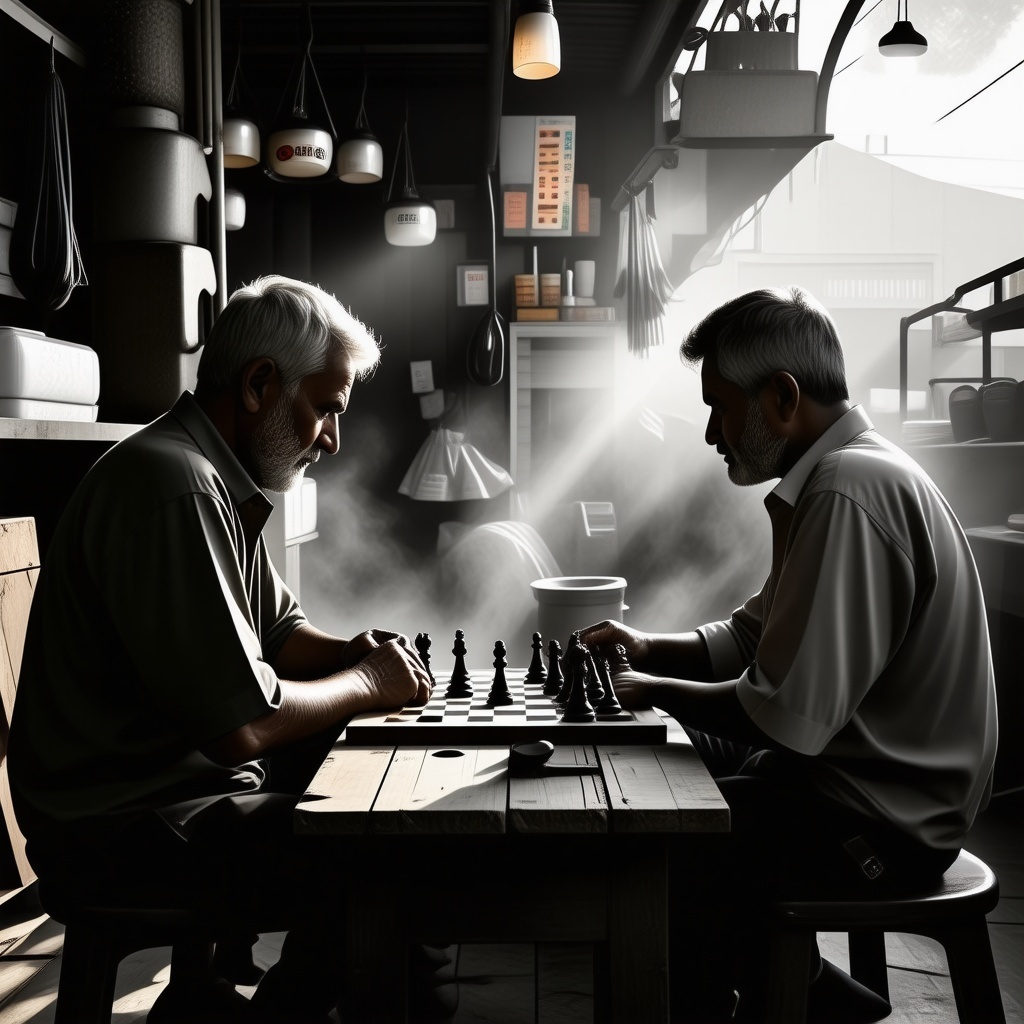The rivalry between Vikram and Arif had lasted for twenty-three years, five months, and a handful of days—depending on whom you asked. If you asked Arif, he would say it began when they were both six years old, standing outside their homes in Old Delhi, staring at a cricket bat that had belonged to neither of them. If you asked Vikram, he would say it started when Arif stole the last question paper leak in their board exams and refused to share it. Either way, their enmity was as old as the cracks in the streets they walked every day.
And yet, despite hating each other with a passion usually reserved for Bollywood villains, life had played its cruel joke: they had always been side by side. School, college, their first jobs, and now this – two fifty-year-old men sitting across from each other in a dimly lit tea shop, pretending the years had been kind.
"Still cheating at chess, I see," Vikram muttered, moving his knight. The wooden board between them had seen better days, much like the men who played on it.
Arif scoffed. "And you're still playing as if you're in a tournament, which you never won, by the way."
That was true. Vikram had been the better player when they were young, but Arif had always had a knack for messing up his concentration at the right moment. A well-timed cough, a sarcastic remark—little things that chipped away at Vikram’s focus. It was a game beyond the game, and it drove Vikram mad.
The tea stall owner, a young boy named Imran, watched them with quiet amusement. He had heard stories about these two. He had seen them at dawn, at dusk, their rivalry never aging, only changing form—like some divine punishment for crimes in a past life.
But today, something was different.
Because today was the last game.
It had begun with a letter. A folded piece of paper, slipped under Vikram’s door. The handwriting was unmistakable—tight, slanted, aggressive.
One Last Match.
Tomorrow. 6 PM. Raju’s Tea Stall.
Come if you dare.
And that was it. No explanation. No context. Just those five words.
Vikram had almost torn it up. He had promised himself that he was done with all this. At fifty, he was too old to be playing petty games with a man he had nothing to prove to. And yet, here he was, sitting across from Arif, moving wooden pieces like their childhood depended on it.
As the game progressed, Vikram began to sense that something was off. Arif was playing too carefully, too cautiously, as if this game mattered more than any they had played before. His usual smirks were absent, his usual taunts left unsaid.
"Getting slow in your old age?" Vikram nudged. "Or is it arthritis?"
Arif barely reacted. "Just thinking."
Thinking? Since when did Arif think before he played?
The realization settled in Vikram’s chest like a stone.
"Are you sick?" he blurted out.
Arif didn't look up.
The silence stretched.
Then, finally, Arif sighed. "Stage four."
The words hung between them, heavy, suffocating. The game was suddenly nothing, the rivalry was suddenly meaningless, and Vikram had no idea what to say.
After a long time, Vikram cleared his throat. "When did you know?"
"Few months ago," Arif said, still staring at the board. "Didn't want to tell anyone. Didn't want to see that look."
"What look?"
"The one you're giving me right now."
Vikram forced himself to blink. He was not going to cry. Not in front of this man. Not in front of anyone.
"You should’ve told me," he said instead.
Arif gave a dry chuckle. "So you could finally win by default?"
"Bastard," Vikram muttered, shaking his head.
"Exactly," Arif smirked, moving his bishop. "Check."
Vikram laughed, a real laugh, one that surprised him.
They continued playing, but now, something had changed. The rivalry was still there, but it was softer, warmer, stripped of all the old bitterness. For the first time, Vikram saw Arif not as an opponent, but simply as the boy who had grown up beside him, who had walked the same roads, fought the same fights, lived the same life in a different body.
By the time the sun had disappeared and the tea stall had emptied, Arif pushed his final piece forward.
"Checkmate," he whispered.
Vikram stared at the board, then at Arif.
He could have won. He saw the move, two turns ago. But for the first time in his life, he had let Arif win.
And for the first time, it felt right.
"Cheater," Vikram murmured.
Arif smiled. "Always."
They sat there a little longer, two old men, two old rivals, two old friends who had never called each other that. The night was quiet, the streets humming with life, the game still lingering between them.
And then, Vikram reached across the board and held out his hand.
Arif hesitated, then took it.
Nothing more needed to be said.
Tomorrow, everything would change. But tonight, the rivalry had finally ended.



 React
React
 React
React
 React
React
 React
React
 React
React